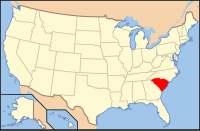Aiken County, South Carolina
| Aiken County, South Carolina | ||
|---|---|---|

Aiken County Courthouse
|
||
|
||
 Location in the U.S. state of South Carolina |
||
 South Carolina's location in the U.S. |
||
| Founded | 1871 | |
| Named for | William Aiken | |
| Seat | Aiken | |
| Largest city | Aiken | |
| Area | ||
| • Total | 1,081 sq mi (2,800 km2) | |
| • Land | 1,071 sq mi (2,774 km2) | |
| • Water | 9.6 sq mi (25 km2), 0.9% | |
| Population (est.) | ||
| • (2013) | 164,176 | |
| • Density | 149/sq mi (58/km²) | |
| Congressional district | 2nd | |
| Time zone | Eastern: UTC-5/-4 | |
| Website | www |
|
Aiken County /ˈeɪkən/ is a county located in the U.S. state of South Carolina. As of the 2010 U.S. Census, its population was 160,099. Its county seat and largest city is Aiken.
Aiken County is a part of the Augusta-Richmond County, GA-SC Metropolitan Statistical Area. It is located in the Piedmont region.
Both Aiken County and its county seat of Aiken are named after William Aiken (1779–1831), who was the first president of the South Carolina Railroad Company. Aiken County was organized during the Reconstruction era in 1871 from portions of Barnwell, Edgefield, Lexington, and Orangeburg counties.
Prince Rivers, a freedman and state legislator from Edgefield County, had been a leader in the United States Colored Troops. He was named to head the commission that drew the new county's boundary lines. He was dubbed "The Black Prince" by local newspapers, including the Edgefield Advertiser. He also led the commission that selected the site of Aiken County's present-day courthouse. Other freedmen who were part of the founding of the county were Samuel J. Lee, speaker of the state House and the first black man admitted to the South Carolina Bar; and Charles D. Hayne, a free man of color from one of Charleston's elite families.
...
Wikipedia

